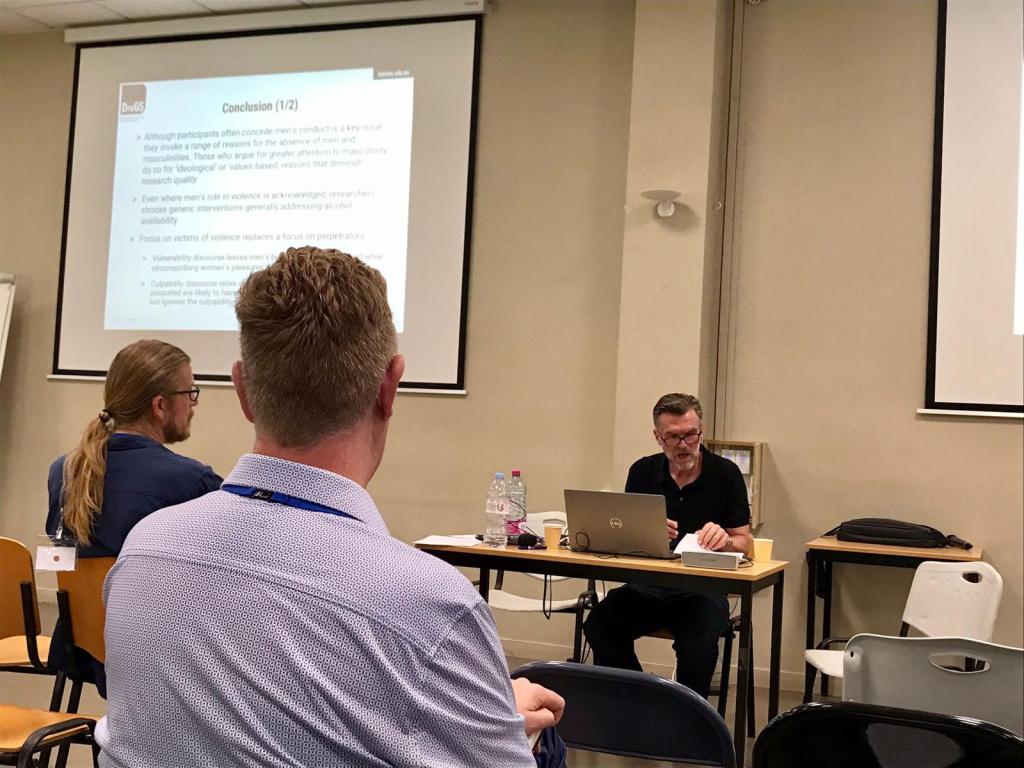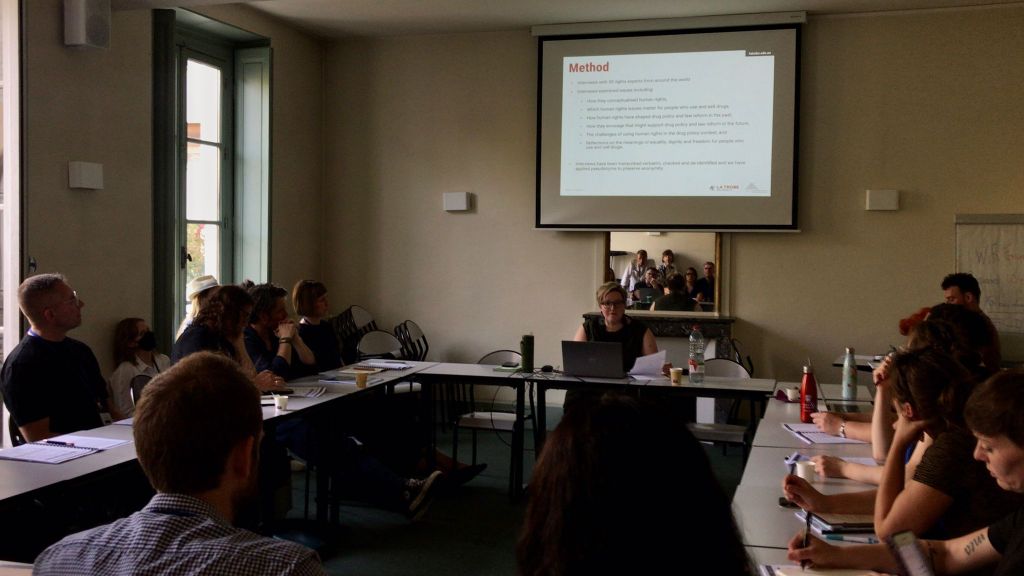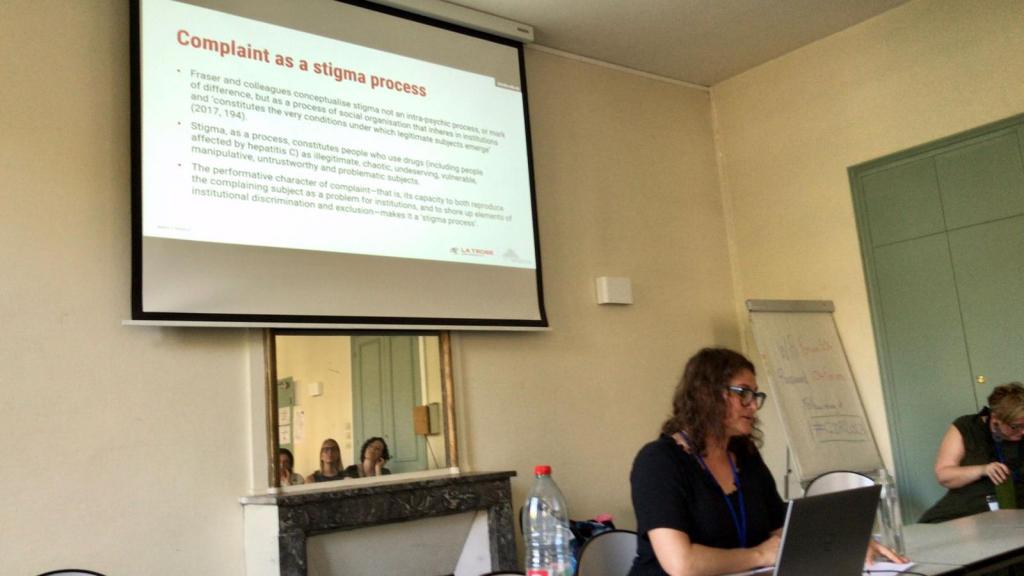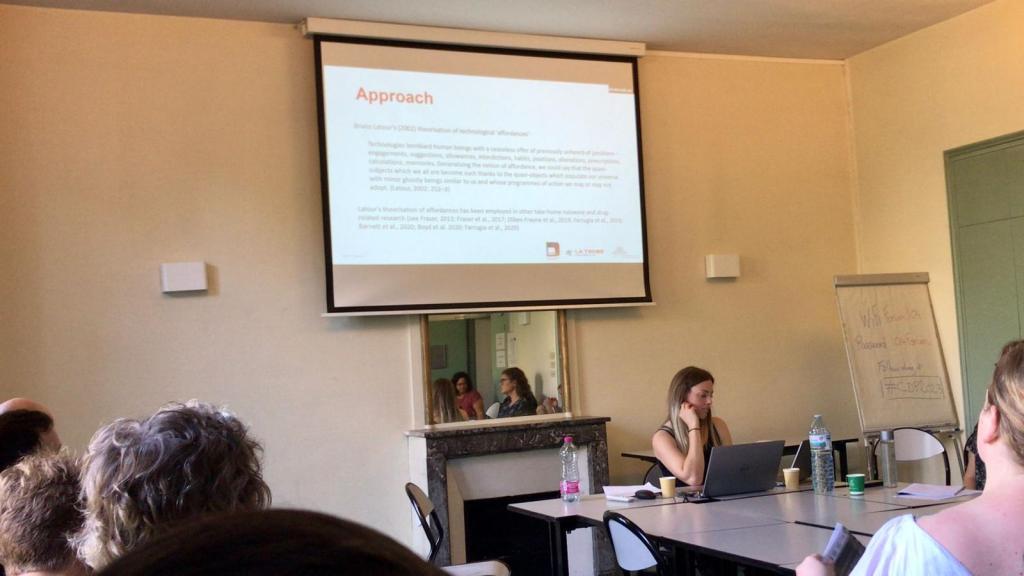In September, DruGS team members travelled to Paris, France, to take part in the Contemporary Drug Problems conference. Co-convened by the journal’s co-editors Associate Professor Kate Seear and Professor kylie valentine along with the conference organising committee, this year’s conference theme was ‘Embracing trouble: New ways of doing, being and knowing’. The theme aimed to acknowledge the work being done in the field of critical drug studies to trouble taken-for-granted assumptions and claims about the effects, harms and nature(s) of alcohol and other drugs.
The DruGS program’s Adjunct Professor Suzanne Fraser opened day one of the conference by delivering the first of three keynote addresses. Entitled ‘“Staying with the trouble” in onto-political research on drugs’, the keynote drew on the work of Donna Haraway in her book Staying with the Trouble (2018) to identify how researchers may ‘embrace trouble’ in productive ways. The keynote address expertly drew together key aspects of Haraway’s work and demonstrated their potential for informing empirical alcohol and other drug research, drawing on Suzanne’s own contributions to the field of critical drug studies. In doing so, the presentation repeatedly drew out what critical thinking and ‘staying with the trouble’ can do, what it attunes us to, and how it can help us to think through ‘problems’ we encounter, including in our jobs as researchers. Most importantly, her address reminded delegates of the ongoing tragedy of the overdose crisis and the importance of staying with this tragedy and finding ways forward through the ruins of the war on drugs, As the opening keynote, Suzanne’s address welcomed and oriented attendees to our current location: to the intellectual history of the CDP conference; to the concerns of this year’s theme; and to the ongoing, iterative work required to ensure the continuation of the field of ‘critical drug studies’ itself.

Several other DruGS team members presented papers at this year’s conference, many of which drew on data generated for various DruGS program projects, including our recent research on alcohol and violence, take-home naloxone, hepatitis C and youth drug education. DruGS Program Lead Dr Adrian Farrugia presented a paper entitled ‘Under pressure: Troubling social norms, autonomy, and competence in Australian drug education,’ developed from his current Australian Research Council (ARC) Discovery Early Career Researcher Award (DECRA) project on drug education. Adrian’s paper troubled the ‘social norms’ approach to drug education, the aim of which is to empower young people to avoid drug consumption by constituting it as uncommon and, therefore, abnormal. He argued that social norms drug education constitutes reproducing, rather than questioning, social norms as the only authentic demonstration of autonomy. Overall, the presentation suggested that, rather than fostering autonomy and critical faculties, social norms drug education paradoxically attempts to enact compliant subjects whose judgment and decisions are contingent on reproducing normative understandings of health.
Adjunct Professor David Moore delivered a paper from an ARC-funded international comparative project on the handling of gender in research and policy on alcohol and violence in Australia, Canada, and Sweden entitled ‘Displacing gender: Troubling concepts and methods in research on alcohol and violence’. Building on earlier work from the same project, David identified and examined three troubling conceptual and methodological processes that have led to the elision of men and masculinities in quantitative research on violence, and offered recommendations for future research practice in which more direct engagement with gender, especially masculinities, is central.

Associate Professor Kate Seear presented a paper on the role of human rights in shaping drug policy, entitled ‘Troubling human rights in the matterphorical lawscape: A dopesick ontology’. In it, Kate drew on her ARC-funded research on developments in drug law reforms that seek to progress the human rights of people who use drugs to propose an alternative way of conceptualising the entanglements of rights, law, drugs, bodies, borders and objects, which she called a ‘dopesick ontology’. Kate’s paper argued that this way of thinking about how human rights ‘work’ has important implications for rethinking the relationship between human rights and drug policy, and for how we conceptualise suffering, accountability and justice.

The conference also included two presentations on recent hepatitis C research. Presenting from a further ARC-funded project on ‘post cure’ lives led by our colleagues in the Gender, Law and Drugs program, Ms Emily Lenton delivered a paper entitled ‘Troubling complaint: The legitimate subject and hepatitis C-related stigma’. Emily asked an important question not yet addressed in the hepatitis C literature: how do people who experience stigma or discrimination feel about making complaints? The paper drew on Sara Ahmed’s (2021) work on complaint to consider what experiences are worthy of complaint, how people enact complaint, what prevents people from complaining, and what is at stake for those who complain. Overall, Emily called for a troubling of complaints, to reconceptualise them not as individual problems, but instead as collective, structural concerns.

The second presentation on hepatitis C was delivered by the DruGS team’s Dr Gemma Nourse. Entitled ‘Optimism and eternal vigilance: Gathering disease, responsible subjects and the hope of elimination in the new hepatitis C treatment era’, Gemma drew on Suzanne Fraser and Kate Seear’s (2011) conceptualisation of hepatitis C as a ‘gathering’ to examine developments around hepatitis C as disease, its treatment and cure in the context of Australia’s current elimination agenda. Overall, she argued that while treatment experiences have dramatically improved, the responsibilisation of people affected by hepatitis C to attain and maintain cure continues to raise enduring ethical and political questions. The work presented here was also based on ARC-funded research.

Dr Nyssa Ferguson presented research conducted for her PhD (also attached to an ARC-funded project) on take-home naloxone training in Victoria, Australia. Entitled ‘Remaking the angry Narcanned subject: Affording new subject positions through take-home naloxone training’, she worked with Bruno Latour’s theorisation of technological ‘affordances’, which suggests that technologies are co-produced within social relations, and ‘afford’ rather than determine specific actions, possibilities, and subject positions, Nyssa argued what she called the ‘angry Narcanned subject’ has come to hold a powerful position in understandings of naloxone. Nyssa examined how take-home naloxone peer trainers work hard to trouble simplistic causal links commonly drawn between naloxone, conflict and distress and, in doing so, drew attention to the ways in which training affords multiple, new subject positions for consumers.

Overall, Contemporary Drug Problems 2023 was a highly generative event for the DruGS team, demonstrating the productivity of the many ARC-funded projects the team has secured and run in recent years, inspiring conversation and thinking about a range of topics, including many that are deeply troubling in their complexity, their politics and their outcomes for people who consume drugs the world over. The conference theme successfully generated a breadth of papers that reminded us of the continued need to engage with trouble and mess, and to continue to trouble the often deeply stigmatising, pathologising and regulatory processes co-constituting matters of drugs, gender and sexuality.
As DruGS Program Lead Dr Adrian Farrugia reflected:
It has been wonderful to attend the CDP conference again after the delays of the past few years, and to reconnect with researchers critically examining issues related to the use of alcohol and other drugs around the world. This conference presents a valuable opportunity to examine how alcohol and other drug ‘problems’ are uniquely configured depending on their cultural, social, and legislative environments. It really is a unique conference in that it generally addresses significant conceptual questions that generate novel ways of critically examining alcohol and other drugs.
The DruGS team values CDP conferences highly and looks forward to participating in and learning from the 2025 event.



You must be logged in to post a comment.